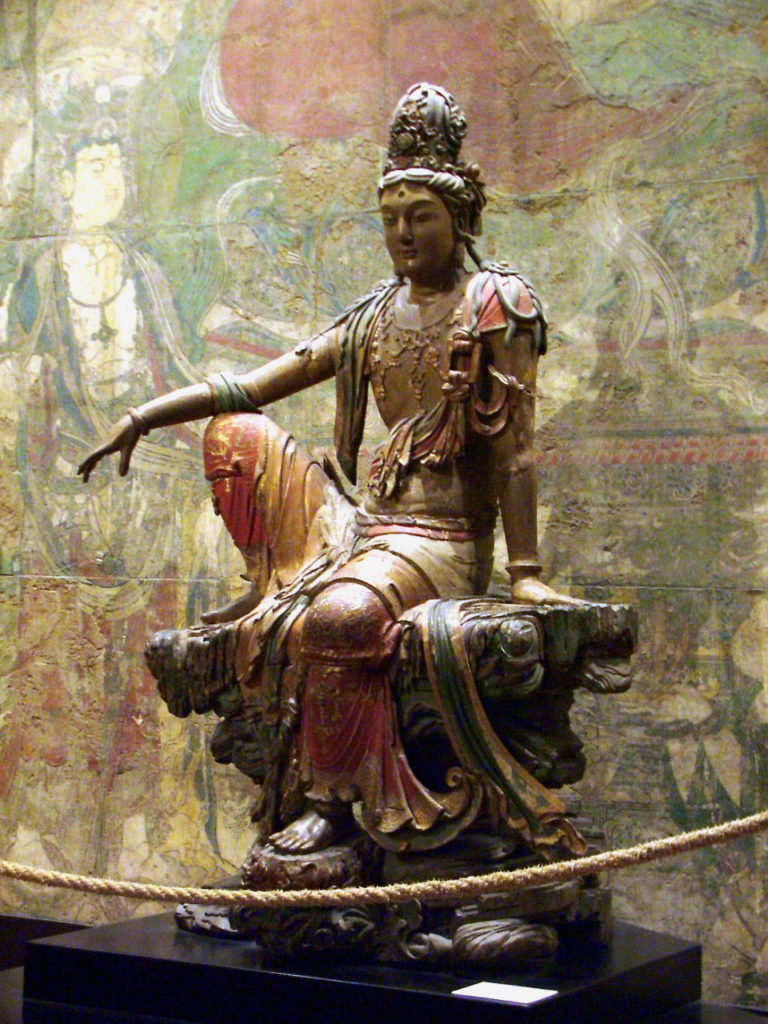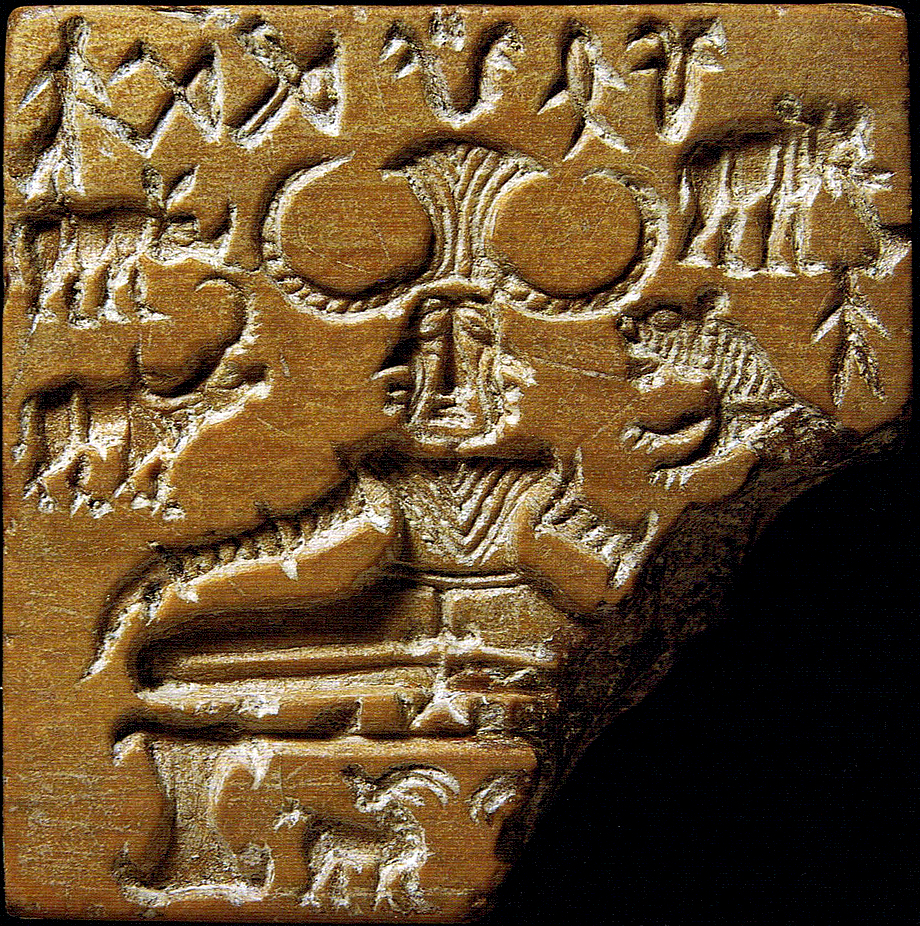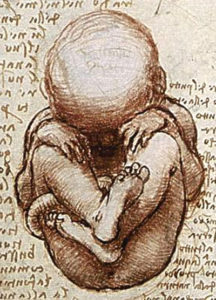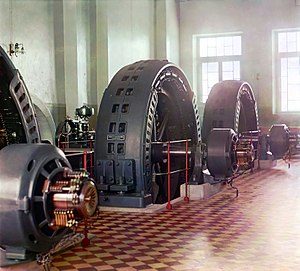
Avalokitesvara_Statue looking over the sea of sorrow – China
Gupta Ji’s car was the first car that I had ever ridden in. His son Munna (his school name was Vishnu, but nobody called him that), was in my class, in the local government school. While my family could not afford any other school Munna was in my school, after going to the better local school, where his caste boys went. He was not happy moving to our bigger school and missed the pampering and love in the old school. . His older brother and sister would dress up, in their uniforms and ties and blazers, and take the bus; to their respective Christian schools, for a ‘better’ education now. Munna being darker, and the youngest, was stuck with us, as he was not the heir apparent, or apple of his father’s eye. His father liked the fairer, stronger and taller elder brother better. Surya was fair after his mother and carried himself well, like her proud soldier father, and Gupta Ji, would praise him to the heavens, behind his back, to Munna and me. Sometimes he even did it when Surya was around, when he got too carried away. Soon Surya would be taller than his father and would still smile, and bow low.
Usha his sister, was the more studious one. I would often see her standing at her bus stand, reading a book, while she was waiting. After some years she got spectacles, and Mrs. Gupta complained, that it came from all the reading. What good would it do a girl, to read so much, and not help her own mother, in the kitchen, and house work? Who would marry a girl with spectacles, or accept a daughter in law, who was nearsighted, and not talented, in everyday affairs? Usha continued to study harder, and Gupta Ji quietly supported her, as she reminded him, so much, of his beautiful wife. He soon discovered that Usha is much smarter, and far more intelligent, and encouraged her education.
My name is Adarsh and my family lived in the Barsati on the top floor of Mr Gupta’s three storey home. Our barsati was a 12 by 11 foot space on the red brick lined roof of their home. A few Asbestos sheets had been thrown across the eight foot walls of the living room, bedroom, kitchen, making a bare roof. The wall was raised another 6 feet at one end in a crude extension of another 10 by 11 feet. This loft had a wooden ladder, led up to this wooden floor boards with a coarse cotton sheet covered by a stuffed cotton mattress, to sleep, read, or play, in one corner. The rest was made for storage of other household goods, pantry, traveling trunks and mother’s things.
It also served as my sleeping space, when I got older with two of my siblings, in the winter. Most of the year we slept on our durries and sheets, on the bricks, on the open terrace. Of course it would get slightly tricky, in the monsoons, when we had to huddle in our barsati, under the Asbestos sheets. Mother and Father of course had their own, wooden legged rope strung beds, and there were two spare ones, kept for any visitors who may arrive.
We were refugees from our town and nobody knew us. Then my father had managed to get some reference from a Bank friend, from his own town, and Gupta Ji had agreed to rent out, his empty barsati to us. Father would leave early in the morning, to work at his fruit stall, near the main cloth and textile Bazar, and would return in the evening. He had long days as he also had to go to the main fruit market, which was half an hour away. He travelled with his cane headgear tray and cotton bags to get supplies, by the local unreliable government bus service. Often he would spend many hours walking to and fro, on days when the bus did not show up, or was too full. He also got some local produce from the farmers around, to replenish his cart on credit, to keep us fed and clothed, during the season.
***
Many years later I was working in New Delhi as an accountant in a public sector enterprise and posted in New Delhi. After finishing High School in our neighboring town, I had gone to the State Capital to do my Bachelor in Commerce and eventually, graduated second in the class. From there I got a stipend in a local accounting firm to try and do my Chartered Accountancy. I also sat for the Government Service and to my family’s surprise passed in my second attempt and became a provincial officer of the Indian Government. Over the years I had worked hard and learned much and got this much desired posting in our nation’s capital.
Munna had gone on after High School to work at his father’s business. His sister who had gone to Delhi University to study on a scholarship insisted that he must at least complete a Degree college. Poor Munna struggled through the Town’s college, when he wished only to be home working in the family business. He failed twice and what should have taken him three years stretched into five. As soon as he graduated Mrs. Gupta married him off to the fair daughter, of one of the leading Spice Merchants, in the Town.
Even I was invited and it was a grand affair, by Gupta standards, with a special DJ brought from the big City to entertain and get us guests, to dance at the private celebrations. Our Barat was welcomed with a huge display of fireworks. Even the elephant that Munna was riding in all his Groom finery, was rented by his Father in Law. He wanted to show off his new educated bridegroom, to his neighbors and fellow townsfolks. We all danced in our colorful turbans and beautiful clothes, to the DJ blaring wedding songs, and encouraging all kinds of ideas. The Brass Band and Drums when we marched down the main road, added to the clamor and cacophony, of the Bania celebration. The wedding had been planned for months, and the clan had gathered from far and near. There was great excitement and celebrations in the joining of two major Bania families.
I briefly met Usha and she had graduated from her Masters in Social Work, from the University of Delhi and worked with some NGOs. She felt that she needed to make a career for herself, in her field. Her mother was forcing her to get married soon and she was literally on display, at her brother’s wedding, for all prospective grooms, in their clan. The boys of course knew little about this, and it was more the Mothers and Aunts, who participated in the gossip, of which boy is available in which family. They decided between them as to which family, will provide the suitable bride. Usha had blossomed into a beautiful, tall, fair, confident woman. She had adopted contact lenses somewhere along the way, and her brown eyes seemed to sparkle, along with all her jewelry.
***
A few year’s later I had met Munna and his family at a common family friend’s wedding. It was good catching up with him and he informed me, that Usha had moved to Delhi. She had recently married into a large family and he asked me to look her up, if I had a chance. I took her address and put the slip in my wallet. He mentioned that his Mother was not happy with her first visit home, after her marriage. There had been loud words spoken in her room, between Usha and his mother. It seemed they wanted her to give up her career. Usha had recently got a job working at an international NGO, which provided health care; to pregnant ladies, and newborn babies. They provided better nutrition and did tests, to identify any problems early. She loved running the group of nurses, who provided the care, even to the poorest of the poor.
Munna gave me her address and told me look her up. He invited me to his new home, if I ever traveled to Jaipur, as they had set up a new branch there. His two older brothers, ran Delhi and Bombay branches, of the family business. His parents preferred to stay with Munna, because the dry weather, helped his mother’s asthma. They were very orthodox and now with the community in the small town becoming abusive of Usha’s ways. They believed strongly that a woman, should stay at home, with her babies. After Asha was born, Usha was up and about in six months. She worked harder at helping even more children at work now, that she had a daughter of her own. A year later she had another daughter, and hired a nanny after six months. Usha continued her work, as she was managing more centers and providers now, in her work.
Three years later I got an assignment in Jaipur, for a week. I pulled out the folded paper from my coat pocket with Munna’s address. We met that evening after work at his home. His wife had cooked delicious snacks and dinner and his young son, crawled around everywhere. Munna had put on weight and he looked very happy. His business was doing well and Gupta Ji was glad to see me and we talked about the old times in Delhi. It was Munna’s wife who whispered to me that all was not well with Usha, as I said good bye.
Two years ago I had looked her up in Delhi. I had looked her up on social media, but couldn’t find her at first. Then I tried with her married name, and suddenly I hit a lot of pages of awards, and recognitions of Usha’s work. Apparently even the State of Delhi, had recognized her NGO’s efforts, in helping reduce death rates, in their areas. More women welcomed the midwives, and the nurses, in their need. Under their guidance the infants became stronger. Each year the NGO trained more, and each year Usha seemed to get a different award for reducing the death rate, by another X percent, or more children getting better nutrition.
I met her in her modern and efficient office near the heart of Lutyen’s Delhi, in an old secretariat building. The place seemed very busy, but she made time for me right away in her large personal office with her name on the table. Usha sha-shoed away her visitors, to spend time with her old friend. She ordered nice aromatic tea, and we ate the delightful snacks, that came from her home and the canteen. We spoke for some time about her daughter, and how life had changed for her. She was happy to see me, but she had to rush off to the British consulate; for a tea affair, and we parted. In parting I noticed splotch marks, on her back, as if she had fallen and hurt herself.
Off and on I would hear about the birth of her second daughter and her return to work. We had our own lives but it was just the comfort of having an old friend close by. She was busy with her work and family. I was astonished to read in the paper one Tuesday morning, that here had been a fire in Usha’s home and she was dead. Munna called and I rushed to Gupta Ji’s house. It was strange to be there after so many decades. I could still hear Usha’s laughter from her room where she read. Munna’s wife greeted me and led me to the room were the men of the family was gathered, in mourning.
“Usha looked so happy when I met her last week, and she was glowing with joy. She was so happy, that she was going to have another daughter. The family wanted her to abort the girl and she refused. They should be all thrown in jail, for doing this to her” was all she whispered to me, as Munna’s old friend. Then she folded her hands and left to be with the other ladies who had come to express their grief. The room door was open and Usha’s mother’s wails, continued to break the home’s silence, in sporadic outpouring of grief.
.It was strange to be in the room, with everyone dressed, in white sitting on white sheets. The only thing in color was Usha’s photo, in an ivory frame and a garland of ivory and flowers, around it. I could not believe that the beautiful woman in full bloom of her life, was no more. I had secretly loved her I realized, from as long, as I could remember. I stared at her smiling face, and then noticed that even in that photo she had a blueish blotch, on her breast, peeking through her sari. Something, more than I had ever know, so personal in my subconscious within me; died, at the realization, of what Munna’s wife, had tried to convey to me, an year ago. I could not imagine that any human could have done this, to my beautiful Usha, for having no sons. In a room of mourning men, I sat on the floor, with tears slowly rolling down, my cheeks quitely. Every shriek of her mother, would pierce my very heart, with added sorrow. I just sat there and thought of all the mothers and children, Usha had helped. In her short and shining life she had given so much to so many. We are all the lesser for being, what we have become, as human compassion has been forgotten.
“Being a candle is not easy,
In order to give light
0ne must burn”
Rumi








